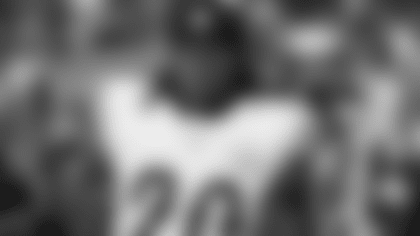RAY ANDERSON NFL VICE PRESIDENT OF FOOTBALL OPERATIONS
Mr. Rooney: This is Ray Anderson. He is going to talk to you. He came to talk to some of the players and coach. This is in the direction of communication; I think it went very well. I will let him tell you more about it, but this is something the Commissioner has considered doing so there could be as much communication between the league office and the teams. Ray has been with the league now for a few years. He is doing a great job as far as the football end of the business, which is why we are all in it. I think from our perspective, the Steelers, Coach Tomlin and the players; I think it went very well. I'll let Ray give you the background.
Ray Anderson, Executive Vice-President of Football Operations: Good afternoon. Thank you, Mr. Rooney. The Commissioner, as some of you may know, is on the way over to London for the game this weekend. So we talked last week with regard to this franchise, that we have a lot of respect for, great admiration for Mr. Rooney, Mike Tomlin and this whole group. Given the discussions last week and some of the comments were made by some of players with regard to the genuineness or the sincerity of our players safety initiatives. We just felt it made sense to come out here so we could communicate and engage directly with Coach Tomlin and the players so that we could talk things out. Listen to them, express their concerns with us about what we are doing, why we are doing it and we in turn could really emphasize with them that the things we are doing, particularly with player safety are meant to protect all players, not just star players and certainly not just quarterbacks. We want to hear what they are saying, hear what the concerns are and we can respond to them and hopefully give you real comfort that this commissioner and all football operations are sincere about the initiatives for player safety, first and foremost. It is because of player safety and not for economic purposes, or not because we just want to protect the star players. It is paramount that we said that numerous times. It just allowed us to get on the same page, for lack of a better term, clear the air so that this club could move on. We're very confident that our interests are aligned with theirs and vice versa.
Were they buying it?
I believe it was a very productive discussion and at the end of the day you can ask Coach Tomlin and the players themselves. They certainly indicated to us that they understand and respect that we took the time to come and talk to them directly. So I would say yes, but I would also say for you to ask them directly. I hope they will confirm that.
What percentage of penalties occur when flags aren't thrown?
It is not a requirement that in fact a flag be thrown before a person can be fined for a foul. What we explained to the players is that 40 percent of the fines are assessed from plays that are not actually flagged on the field. We explained that it is not just the seven officials on the field who monitor play, specifically for safety. Back at our command center in New York, 280 Park Avenue, every Sunday we have a significant command center about the size of this room where every game is being individually monitored and also viewed by Mike Pereira, our vice-president of officiating and other supervisors so that any play that involves a serious injury, challenge or hit that appears to be particularly egregious whether flagged or not is being monitored. Then Monday and Tuesday of the next week, we sit there with all of the supervisors and trainers and go over those plays. In fact about 40 percent of those plays that end up getting fined or sent up to review are not flagged on the field. You have seven officials at game-time speed. They aren't going to catch everything, but in our office we are particularly looking at player safety violations. We will fine you even though you haven't been flagged.
You referred to game-time speed; how can a player at game-time speed adjudicate the legality on the field of a potential hit?
I don't know if he can adjudicate in game-time speed. What we are trying to emphasize is that there are illegal techniques, for instance, helmet-to-helmet contact. It will be up to the player and up to the coaching staff to play and coach in practice, with the thought that helmet–to-helmet, it is just out of what I do because I am not practicing that way. I am not playing that way. We certainly understand and appreciate that this is a fast game, it is a violent game, and players have been taught and coached certain way. When it comes to dangerous techniques, cheap shots, dirty play, we have to put the burden on the player and the coach to figure that out. We can't get into everybody's head with regard to what their intent is. We certainly understand that adjudication, that's a big word when you are talking about players having to figure out, is it legal or not legal. We are trying to be as clear as we can and hopefully they will buy in, that they will themselves know the difference and hopefully bring that to their play on the field.
How did you address Troy Polamalu's concerns of this turning into a "pansy league"?
Our discussion with Troy wasn't whether or not it was a pansy league or not. Our discussion with Troy was that we wanted him to understand that our interests and emphasis on player safety was genuine, was sincere and it wasn't driven by money or the economics. It wasn't driven by just trying to protect the star players. It was legitimately about player safety, so any indication and any comments that made it seem that it was money first and foremost, that was just misdirected and we wanted to make sure he understands that our concern about player safety is real and it's not about the money.
Was Hines Ward fined for the hit in the Cincinnati game?
No he was not. Under the current rules it was a legal hit. It was head up, in front, there may have even been in fact some helmet to helmet, but that player under current rules is not considered a player in the defenseless posture. So under the current rules that was a legal hit. Now, will that hit be reviewed by the competition committee next year, or a potential tweak of the rule? When you have a player who is exposed like that and you get blind-sided and you have helmet-to-helmet contact, is that defenseless player in the situation somewhat defenseless? So will we look at the player and others like it, by the competition committee and determine if a tweak of the rule is necessary? I will honestly tell you yes. We are going to look at that, but under the current rules as written now, it was a clean hit. It was a legal hit. Some people will say it was not necessary, but that's for others to judge. He was not fined because under our current rule it was a legal hit.
Any additional fines given to the Steelers in the Cincinnati game?
I couldn't tell you off hand. At the end of the day we have Gene Washington and others who do the first round of assessing fines. One of the things we did explain to the players was to not get frustrated because you got fined and you don't know if the guy you got tangled up with, that you think was equally at fault, didn't get fined too. We don't publicly distribute the fines on the weekly basis, all of the fines for all of the players. Some of it becomes public because it is leaked or the players will announce it or the club will announce it. But we assure that the process doesn't automatically publish all of the fines.
Wouldn't it help the fans and players understand better if you released all of the fines?
They could, but there are privacy and confidentiality issues and agreements with the Players Association with regard to what you do and do not publish. But the point is well taken. With complete transparency leading to better understanding, which is something that I would tell you is not necessarily off the table. It may be something at some point that we discuss.
On average, how many fines are given out per week?
We had 139 fines assessed through last week's games. I believe 77 of those were uncalled fouls, to your point that not all fines are on fouls that are actually flagged.
Re: Suggs comments on having bounty out for Rashard Mendenhall and Hines Ward.
We certainly are looking into it. That bounty notion is completely against the rule and to the extent that if someone is engaged in that activity, we will look into it aggressively. The answer to the question is yes, because we trying to determine the completeness of the circumstances. So yes we will look into and if it is determined in fact that it was bounty verified, there will certainly be accountability.
Will you take this seminar/visit to other teams or just here?
Ironically we had a visit to Baltimore last year. When there was that one game where there was a lot of criticism of officiating, including some vulgarities that are completely unfit for family hearing. The tossing of the flag into the stands, remember that? We went down and sat with Ozzie Newsome and some of the team leaders and guys involved with that to engage the same way to make sure we are listening to you and equally importantly you need to understand that we are serious about these initiatives and player conduct and addressing these issues before they get out of hand. This was an opportunity to do that. The Commissioner has been out talking to a lot of clubs. We get out during training camp and when we deem it necessary and frankly when the club also deems it as an opportunity to get ourselves together and on the same page.
Are you here regarding the comments that were made or are you here because of the play on the field?
We are here for both reasons. We are here because there have been come comments that indicated that the messages are mixed and we shouldn't have that. We are here because we have great respect for Mr. Rooney and Mike Tomlin and this whole organization and all of the players who had public comments. It was to make sure that we had a chance to directly engage and talk things though. So it was a combination.
Can you clear up what it was exactly that Hines Ward did in the Jacksonville and Baltimore games to warrant a fine?
I don't assess those fines. I would have to defer that to Gene Washington, on the technical things. I am unprepared to answer that question.
Is it possible to play too hard?
I don't think it is possible to play the game too hard. I think there is a fine line between hard and excessive. I think here is a fine line between what's appropriate and what is unnecessary. It is a tough game and that is what makes it attractive to so many people. It is a tough game and it is frankly violent. It is a fine line.
How are defensive headsets being received?
We've had very positive reports on the defensive headsets. We are not there yet. We will get a better analysis after the season as to whether or not the playing field is completely leveled, but the early indications are that the defensive side of the ball thinks that it has helped significantly.
How do guys' reputations play into fines?
Certainly one of the components that goes into the evaluation is your history. So if you are a repeat offender of the same type of fine, certainly your history will play into how we evaluate a particular case. Each case is evaluated on its own fact and circumstances. So you look back and you see that the players have two or three of these in the last year, certainly that plays into the discipline in that particular case.
Did you speak with specific players or the whole team?
Not with the whole team. Coach Tomlin and Mr. Rooney determined which players were appropriate. So we came in and sat with a small group and I think we had a very productive exchange.
Have you been watching Hines Ward more closely?
No. We haven't singled anyone out and certainly not Hines Ward at all. Just the events and the comments from last week indicated that this thing was bubbling up and it made some sense to come in here and try to address it face to face.
Re: Players are concerned with how they are supposed to know if a player is defenseless or the play is over.
Well hopefully the whistle and the other things that indicate the end of the play will be pronounced enough by that as a signal.
Within the play, how are they supposed to know a player is out of play?
I happen to be one of those that players really do know right from wrong. They have been playing long enough that they know that. We also believe very emphatically that 99.8 percent of our players have no desire or intentions to hurt one of their peers. So we believe intuitively that players know when the play is over. The circumstances for purposes of actualizing or in the excuse making leads you to believe otherwise, but we happen to believe that players who have been on the field all of their lives, they know when the play is over. They know when it is time to stop. We believe they really know right from wrong when they are out there on the field. I don't know if that answers your question but I don't know if I can address it anymore.
You said 40 percent are non-flagged calls. What have you seen with helmet to helmet?
I don't have it broken down like that. Just from seeing the plays and most of the stuff that comes in, particularly the helmet-to-helmet, we draw those up and look at those as a group with regard to the folks in the officiating department, myself, Ron Hill and others. A number of the helmet-to-helmets aren't flagged because they happen so fast. The referees don't always have the ideal angle. When you have the benefit of seeing it at multiple angles, in slow motion on HD in the office, it is easier to determine that than bang-bang on the field with 22 guys flying around.
Can you say which players were in the meeting?
I would refer that to Mr. Rooney. If he thinks that is appropriate to divulge, I will. Otherwise, I will refer that to him.
Are all quarterbacks equal; do you play favorites?
I would tell you that our officials don't keep track of who the quarterback is. I would like to absolutely believe and tell you that it doesn't make any difference if you are Peyton Manning or if you are Ron Hill.
Do you believe that?
Would I believe it? I believe it, because I believe our officials are professionals. I believe they are human. I believe they are prideful and I believe they do not try to play favorites at all. I've got to believe that, because if we don't and there is any indication that they are not that way, they will not be officiating in the NFL.
Is missing 40 percent of the calls acceptable?
It's not missing 40 percent of the calls. Every play in the NFL, I think anyone who watches football will tell you, there is always a violation intentional or not. Holding, little twitch here and there, so I would dispute that you are missing 40 percent of the calls. You can't possibly make, with seven guys on the field, as big as the field is, all of the calls at game-time speed. You might think it's easy, but I challenge you. Come into our office, hang out with our officiating crew, real game-time and I think you will have a greater appreciation. I don't mean to be defensive, but when I hear those types of comments they actually kind of stir me up because I don't think you realize how hard it is at game-time speed, so it's not missing 40 percent of the calls, it's making the calls they are able to detect. It's a lot easier for us sitting in New York with all of these angles and the HD and slow motion to determine 40 percent of the penalties, the fines or fouls that should have been in the ideal world flagged, but they weren't, they can't be.






